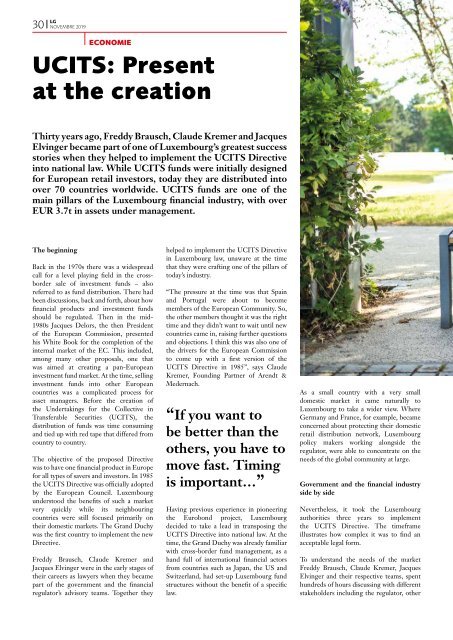LG_228
Au paradis artificiel d’une fumette responsable Après le cannabis médical en début d’année, le gouvernement luxembourgeois entend légaliser le récréatif d’ici deux ans. Une étape subséquente et commune à toutes les législations étrangères qui ont entrepris ce libéralisme. L’ambition est de produire un chanvre local pour approvisionner une distribution nationale à destination d’une consommation autorisée uniquement à domicile. Des licences seront vendues aux producteurs et distributeurs soumis à un catalogue de règles respectives. Face à la gronde des trois pays voisins et pour éviter des contrôles à ses frontières, le Luxembourg désire cantonner la vente à ses résidents. Un véritable casse-tête dans la mesure où l’adresse n’est pas toujours inscrite sur les cartes d’identité, qu’il faut veiller à la protection des données personnelles et que l’Union européenne interdit «toute discrimination exercée en raison de la nationalité»1 . La mesure censée éviter un tourisme de la drogue oublie que les frontaliers se côtoient, se mélangent et se connaissent depuis des siècles. Autre obstacle juridique: les trois conventions internationales de l’ONU sur le contrôle des stupéfiants qui les limitent à des fins médicales et scientifiques. Le Canada, signataire comme le Luxembourg et souvent cité en exemple, est dorénavant considéré comme «fraudeur» auprès de l’Organe internationale de contrôle des stupéfiants.
Au paradis artificiel d’une fumette responsable
Après le cannabis médical en début d’année, le gouvernement
luxembourgeois entend légaliser le récréatif d’ici deux ans.
Une étape subséquente et commune à toutes les législations
étrangères qui ont entrepris ce libéralisme. L’ambition est de
produire un chanvre local pour approvisionner une distribution
nationale à destination d’une consommation autorisée uniquement
à domicile. Des licences seront vendues aux producteurs et
distributeurs soumis à un catalogue de règles respectives.
Face à la gronde des trois pays voisins et pour éviter des contrôles à ses
frontières, le Luxembourg désire cantonner la vente à ses résidents.
Un véritable casse-tête dans la mesure où l’adresse n’est pas toujours
inscrite sur les cartes d’identité, qu’il faut veiller à la protection des
données personnelles et que l’Union européenne interdit «toute
discrimination exercée en raison de la nationalité»1
. La mesure censée
éviter un tourisme de la drogue oublie que les frontaliers se côtoient,
se mélangent et se connaissent depuis des siècles.
Autre obstacle juridique: les trois conventions internationales de l’ONU
sur le contrôle des stupéfiants qui les limitent à des fins médicales et
scientifiques. Le Canada, signataire comme le Luxembourg et souvent
cité en exemple, est dorénavant considéré comme «fraudeur» auprès
de l’Organe internationale de contrôle des stupéfiants.
Create successful ePaper yourself
Turn your PDF publications into a flip-book with our unique Google optimized e-Paper software.
30 <strong>LG</strong><br />
NOVEMBRE 2019<br />
ECONOMIE<br />
UCITS: Present<br />
at the creation<br />
Thirty years ago, Freddy Brausch, Claude Kremer and Jacques<br />
Elvinger became part of one of Luxembourg’s greatest success<br />
stories when they helped to implement the UCITS Directive<br />
into national law. While UCITS funds were initially designed<br />
for European retail investors, today they are distributed into<br />
over 70 countries worldwide. UCITS funds are one of the<br />
main pillars of the Luxembourg financial industry, with over<br />
EUR 3.7t in assets under management.<br />
The beginning<br />
Back in the 1970s there was a widespread<br />
call for a level playing field in the crossborder<br />
sale of investment funds – also<br />
referred to as fund distribution. There had<br />
been discussions, back and forth, about how<br />
financial products and investment funds<br />
should be regulated. Then in the mid-<br />
1980s Jacques Delors, the then President<br />
of the European Commission, presented<br />
his White Book for the completion of the<br />
internal market of the EC. This included,<br />
among many other proposals, one that<br />
was aimed at creating a pan-European<br />
investment fund market. At the time, selling<br />
investment funds into other European<br />
countries was a complicated process for<br />
asset managers. Before the creation of<br />
the Undertakings for the Collective in<br />
Transferable Securities (UCITS), the<br />
distribution of funds was time consuming<br />
and tied up with red tape that differed from<br />
country to country.<br />
The objective of the proposed Directive<br />
was to have one financial product in Europe<br />
for all types of savers and investors. In 1985<br />
the UCITS Directive was officially adopted<br />
by the European Council. Luxembourg<br />
understood the benefits of such a market<br />
very quickly while its neighbouring<br />
countries were still focused primarily on<br />
their domestic markets. The Grand Duchy<br />
was the first country to implement the new<br />
Directive.<br />
Freddy Brausch, Claude Kremer and<br />
Jacques Elvinger were in the early stages of<br />
their careers as lawyers when they became<br />
part of the government and the financial<br />
regulator’s advisory teams. Together they<br />
helped to implement the UCITS Directive<br />
in Luxembourg law, unaware at the time<br />
that they were crafting one of the pillars of<br />
today’s industry.<br />
“The pressure at the time was that Spain<br />
and Portugal were about to become<br />
members of the European Community. So,<br />
the other members thought it was the right<br />
time and they didn’t want to wait until new<br />
countries came in, raising further questions<br />
and objections. I think this was also one of<br />
the drivers for the European Commission<br />
to come up with a first version of the<br />
UCITS Directive in 1985”, says Claude<br />
Kremer, Founding Partner of Arendt &<br />
Medernach.<br />
“If you want to<br />
be better than the<br />
others, you have to<br />
move fast. Timing<br />
is important…”<br />
Having previous experience in pioneering<br />
the Eurobond project, Luxembourg<br />
decided to take a lead in transposing the<br />
UCITS Directive into national law. At the<br />
time, the Grand Duchy was already familiar<br />
with cross-border fund management, as a<br />
hand full of international financial actors<br />
from countries such as Japan, the US and<br />
Switzerland, had set-up Luxembourg fund<br />
structures without the benefit of a specific<br />
law.<br />
Copyright: Mike Zenari<br />
As a small country with a very small<br />
domestic market it came naturally to<br />
Luxembourg to take a wider view. Where<br />
Germany and France, for example, became<br />
concerned about protecting their domestic<br />
retail distribution network, Luxembourg<br />
policy makers working alongside the<br />
regulator, were able to concentrate on the<br />
needs of the global community at large.<br />
Government and the financial industry<br />
side by side<br />
Nevertheless, it took the Luxembourg<br />
authorities three years to implement<br />
the UCITS Directive. The timeframe<br />
illustrates how complex it was to find an<br />
acceptable legal form.<br />
To understand the needs of the market<br />
Freddy Brausch, Claude Kremer, Jacques<br />
Elvinger and their respective teams, spent<br />
hundreds of hours discussing with different<br />
stakeholders including the regulator, other


















